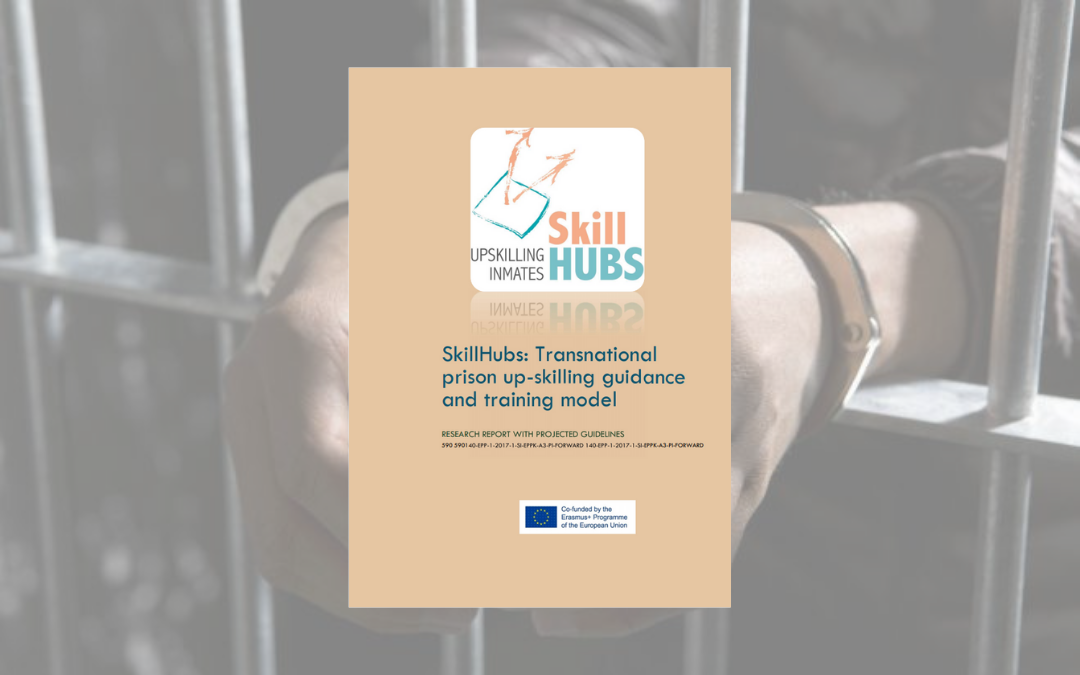The two-year SkillHUBS project – Transnational Prison Upskilling Guidance and Training Model (funded by Erasmus+ KA3) is coordinated by the Trebnje Centre for Education and Culture. It involves very diverse organisations: The University of Malta, the L&W Institute from Leicester, UK, the EAEA, the Baia Mare Prison in Romania, the International Corrections Prison Association, and the SIAE. Most of the organisations from this diverse array have many years of experience, and enjoy a reputation in the education of prisoners, devoting efforts to improving their living conditions. The project partners met at a two-day working meeting on 18 and 19 February at the EAEA headquarters in Brussels. We discussed the progress and the results of the pilot programmes for inmates in three countries and the necessary adjustments to the new model of prison upskilling. The drafting of recommendations for the implementation of the upskilling model for policy makers, prison administrations at various levels, and adult educators was also on the agenda. We also prepared the contents and agenda for the closing international conference of the project, which was planned to be held in Ljubljana this May but has recently been postponed to a later date due to the Covid-19 pandemic. It will be targeted at the makers of upskilling policies and policies on the enforcement of sentences, prison educators, professionals and other staff involved in integrating prisoners into society, as well as job providers and employers.
The aim of the SkillHUBS project was to design and pilot test a new model of prison education, especially for less educated prisoners, several years absent from society and the labour market, who will be released in less than one year. These persons are known to have a particularly difficult journey to integrate into society, and an even more difficult one to enter the labour market. They most often lack the knowledge, skills and competences expected by employers, and their employment is accompanied by a number of other problems, including the stigma of serving a sentence. The less educated, however, often decline education and training that would make their path easier. Numerous sources and research (see for example, Equipping Individuals for Life Beyond Bars, 2019) indicate that education and training for prisoners offers the most effective preparation for reintegration into society.
Two years of development work within the project yielded a Report on the situation and needs in prison upskilling in partner countries, which relied, inter alia, on the data from a completed questionnaire formulated within the project. The report underpinned the need for new approaches and programmes for the development of basic skills of prisoners and the development of literacy and numeracy skills, creativity, digital skills, and problem solving. Based on the recommendations, the lead partner, L&W Institute, in co-operation with Trebnje Centre for Education and Culture and SIAE, elaborated the idea of a new upskilling model – SkillHUBS. It comprises three elements. The first consists of a methodology and a set of tools for employers’ skills needs research, and an estimate of the educational needs of prison inmates. The second provides guidance on a needs-based programme formation for group or individual learning projects, also defining flexible approaches to programme implementation, i.e. “SkillHUBS engine” (a kind of implementation protocol). The third constitutes instruments for monitoring progress and recording achievements. The model is based on co-creative learning. In the model, it is described as “a participant-based approach to teaching and learning”. It is based on practices that enable the close involvement of participants and educators in co-creating the educational programme from planning to impact evaluation.
To a large extent, the model relies on the results and curriculum of the Life Skills for Europe project, as well as the so-called theory of change, central to which is the empowerment of prisoners through education and raising social capital.
An important activity in the scope of the project was the pilot training for trainers and other experts from all partner countries, at the L&W Institute’s headquarters in Leicester. The training curriculum comprised a detailed presentation of the SkillHUBS model, and enabled professionals to prepare for rollout in their home countries. The five-day training programme also showed the need for developing forms of continuous training for prison educators.
The two-year project yielded a well-thought-out and innovative model of inmate training that could be adapted and adjusted to different needs and contexts. The results of the pilot implementation in Slovenia (in Dob Prison) and Romania (in Baia Mare Prison) show that the model produced the desired outcome, motivated prisoners to learn and educate themselves, enabled the acquisition of new knowledge, skills and competences, and above all, encouraged prisoners for new learning. In Romania and Slovenia, the introduction of the model into the prisoner education system is being considered (in Romania within the framework of the existing prison education, and in Slovenia within the scope of adult education with a potential new publicly applicable educational programme). How the project results will be implemented in various countries, including Great Britain and Malta, will be discussed at the closing conference. Due to the postponement of the conference all project results will be gradually posted on the project website SkillHUBS.
Estera Možina, MSc (ester.mozina@acs.si), SIAE


